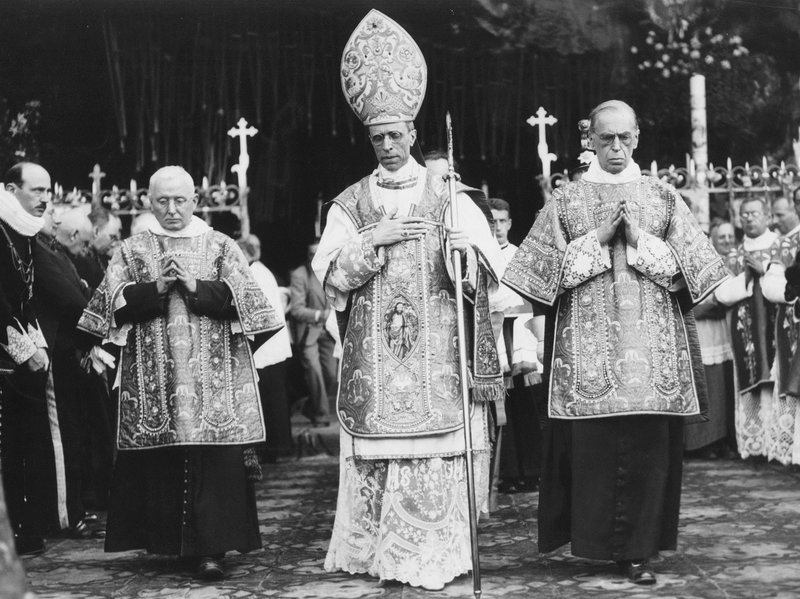The Vatican opens the archives of Pope Pius XII of the Second World War

After decades of pressure from historians and Jewish groups, the Vatican on Monday began to allow scholars access to the archives of Pope Pius XII, the controversial pontiff of the Second World War.
Officials of the Roman Catholic Church have always insisted that Pius did everything possible to save Jewish lives. But he remained publicly silent while about 6 million Jews were killed in the Holocaust.
More than 150 scholars have applied to study documents regarding his papacy, which lasted from 1939 to 1958. Typically, the Vatican waits 70 years after the end of a pontificate to open its archives to scholars.
Speaking with journalists on 20 February, the Vatican's chief librarian, Cardinal José Tolentino Calaça de Mendonça, said that all researchers, regardless of nationality, faith and ideology, are welcome.
"The church is not afraid of history," he said, echoing the words of Pope Francis when he announced his intention to open the archives of Pius XII a year ago.
Officials of the Roman Catholic Church have always insisted that Pope Pius XII, shown here in an undated photo, did everything possible to save Jewish lives. But he remained publicly silent while about 6 million Jews were killed in the Holocaust.
Jewish groups welcomed the opening of the archive. "In inviting historians and scholars to publicly access the archives of World War II at the Vatican, Pope Francis is demonstrating a commitment to learning and broadcasting the truth, as well as to the meaning of the memory of the Holocaust," he said World Jewish Congress President Ronald S. Lauder in a statement.
Johan Ickx, a Vatican archivist, says scholars will have easy access to files.
"We have now passed 1 million 300.000 documents that are digitized and interfaced with an inventory for it, to help researchers go quickly," he says.
Those researchers had been waiting for a long time. A German comedy from 1963, Rolf Hochhuth's deputy, raised questions about Pio's war role and accused him of complicated silence in the Holocaust. The Vatican's attempts to beatify him are hampered by still vivid memories in Rome of his behavior towards the Jews of the city during the Nazi occupation.
A plaque on the wall outside a military college in Rome commemorates the collection of 1.259 Jews. It reads: “On October 16, 1943 entire Jewish Roman families torn from their homes by the Nazis were brought here and then deported to extermination camps. Of more than 1.000 people, only 16 survived. "
A plaque in Rome commemorates the raking and deportation of Jewish families by the Nazis to the extermination camps on October 16, 1943. "Of more than 1000 people, only 16 survived," says the plaque.
Sylvia Poggioli/NPR
The location is only 800 meters from St. Peter's Square - "under the same windows as the pope", as reported by Ernst von Weizsacker, who at the time was the German ambassador to the Vatican, referring to Hitler.
David Kertzer of Brown University has written extensively on popes and Jews. He won the Pulitzer Prize 2015 for his book Il Papa e Mussolini: the secret history of Pius XI and the rise of fascism in Europe, on the predecessor of Pius XII, and has reserved a desk in the Vatican archives for the next four months.
Kertzer says that much is known about what Pius XII did. Much less is known about internal deliberations during the war years in the Vatican.
"We know that [Pius XII] has not taken any public action," he says. “He did not protest for Hitler. But who in the Vatican could have urged him to do so? Who could have advised caution? This is the kind of thing that I think we will discover or hope to discover. "
Like many historians of the church, Massimo Faggioli, who teaches theology at the University of Villanova, is also curious about the role of Pio after the Second World War, during the Cold War. In particular, he wonders, did Vatican officials intervene in the Italian elections in 1948, when there was a real chance of victory for the Communist Party?
Pope Pius XII's handwriting is seen on a draft of his 1944 speech, shown during a guided tour for the media of the Vatican library on Pope Pius XII on February 27.
"I would be curious to know what kind of communication there was between the Secretariat of State [Vatican] and the CIA," he says. "Pope Pius was certainly convinced that he had to defend a certain idea of Christian civilization in Europe from communism".
Kertzer is certain that the Catholic Church has been horrified by the Holocaust. Indeed, several thousand Jews found refuge in Catholic convents in Italy. But what he hopes to better understand from Pio's archives is the role played by the church in the demonization of Jews.
"The main vendors of defamation of Jews for many decades were not the state, it was the church," he says. "And he was defaming Jews until the 30s and the beginning of the Holocaust, if not in it, including Vatican-related publications."
This, says Kertzer, is what the Vatican has to deal with.